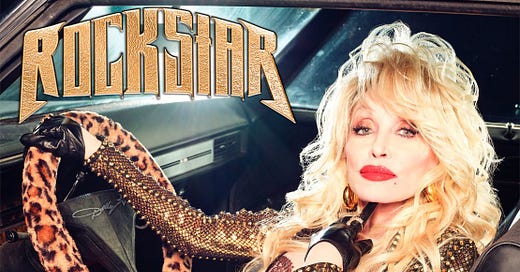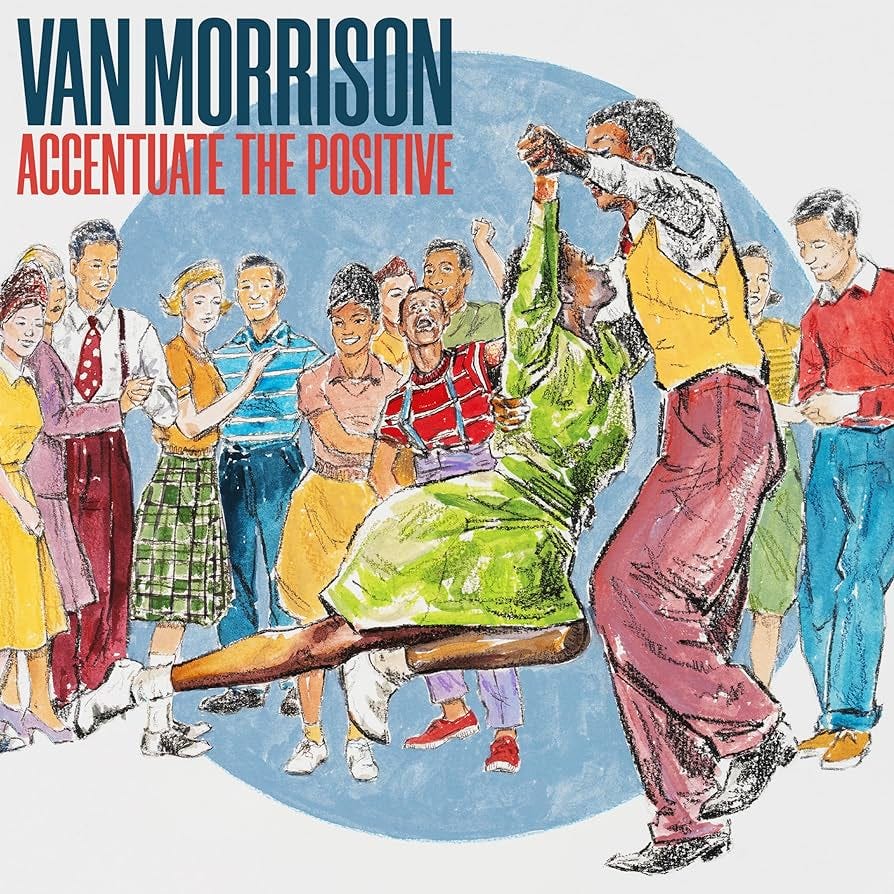Dolly Parton and Van Morrison Choose Nostalgia
A pair of good-time covers albums that I don't particularly like.
Dolly Parton—Rockstar (2023)
Dolly Parton made Rockstar to celebrate her 2022 induction into the Rock and Roll Hall of Fame but it's also possible she cut the record from something of a reactionary position. Initially disinclined to accept the Rock Hall's honor because she'd never made a rock record, she eventually warmed to the inclusion and vowed that she would make her own rock & roll album. Hence, Rockstar, a double album that contains a nod to virtually every classic rock style within its two hours and twenty minutes.
That's right, Rockstar is roughly the length of Rio Bravo or Forrest Gump and, fittingly, it plays as a cross between a hangout film and a nostalgia trip. It's a record with no urgency and no curiosity: it basks in the reflective glow of our collective memory of songs we know by heart. That's not quite the same thing as beloved songs. Sure, Rockstar is rife with such undisputed classics as "(I Can't Get No) Satisfaction" and "Purple Rain" but its ungainly sprawl means there's plenty of space for AOR balladry from Journey and REO Speedwagon, standard-issue struts from Pat Benatar and Joan Jett, sweet nothings from Peter Frampton and "What's Up?," the enduring dirge from 4 Non Blondes.
Given this track list, it comes as no surprise that the guest list for Rockstar is inclusive to a fault, with Dolly opening her studio doors to everybody from Lizzo to one-time Elvis impersonator Ronnie McDowell. It's not pandering so much as proof that Parton deliberately attempts to appeal to every sector of the marketplace while appearing to do nothing more than deliver a good show. Part of Parton's appeal is how she never shrinks from artifice but that unabashed embrace of plastic tends to work better on the stage than it does on record when it's too easy to fixate on an appearance by Kid Rock.
Inviting Kid Rock to appear on your album in 2023 is certainly a choice, one that comes with full acknowledgment of his role as the loudest rocker in MAGA world. Historically, Parton has avoided politics and she maintains this studied bipartisan stance on Rockstar by designing it as a wayback machine to a fantasy world where rock & roll contained no rebellion or bite. Witness how it opens with a sketch that flips Mark Metcalf's rant from Twisted Sister's "We're Not Gonna Take It" on its head. Where Metcalf carried a cartoonish terror as he raged "I carried an M15 and you…you carry that..that!...guitar!," Parton laughs off her dad complaining about all that noise, supported by a mother saying "it's her dream, her passion" to be in rock & roll.
Set aside the fact that it's deeply weird for the 77-year-old Parton to position herself as a rebellious teenager: this sketch and the album itself treat rock & roll as a fashion to try on and discard. That's not inherently a bad thing, especially if the music sounded trashy and disposable. Rockstar is far too expensive to be so lightweight. It's the work of a bunch of pros so seasoned, they sometimes don't need to be in the same studio to complete a track (a good portion of the duets seem constructed over telephone). A collection of pros are bound to make a listenable album and, on more than one occasion, Rockstar does have some verve. Usually, that energy derives entirely from an eager duet partner: Rob Halford is itching to tear it up with Parton on her original "Bygones," while Stevie Nicks hams it up on "What Has Rock and Roll Ever Done for You," a number she's had kicking around for ages. Tellingly, neither of these songs are as familiar as "Let it Be" or "Every Breath You Take," which may be another reason why they seem lively: they sound fresh because they're not part of our shared subconscious.
Those memories of the original versions along with the eras they initially inhabited looms over Rockstar, especially because Parton is intent on having her renditions hue as closely to the classics as possible. That adherence to a common pop vernacular can be unifying in concert but it's stultifying on record, curdling Parton's innately good-natured charm and leaving behind something that feels entirely too fussy and calculated.
Van Morrison—Accentuate the Positive (2023)
It's hard not to interpret Accentuate the Positive, the title of Van Morrison's 45th studio album, as an attempt by the cantankerous singer to leave behind all those nasty comments he made during the early days of the COVID-19 pandemic. The same thing could be said about the name of Moving On Skiffle, the other double-LP of covers he released earlier in 2023. Freed from the need to write such polemics as "They Own the Media" and "Why Are You on Facebook?," Morrison chose to sing good-time oldies until he soothed his troubled soul.
Covers albums have been a considerable part of Morrison's repertoire since at least the mid-1990s when he cut a bunch of jazz standards with Georgia Fame on the snappy How Long Has This Been Going On. Unabashedly old-fashioned, these retro records seemed like a way of keeping a specific swinging tradition alive, preserving the sound, songs, and aesthetics of a time when jazz and R&B weren't separate genres.
There's a fine line between carrying a torch and basking in the warm glow of an imagined yesteryear and Accentuate the Positive tilts firmly toward the latter. Its fundamentals are familiar: it's the sound of a small combo cooking away, finding pleasure in playing the same changes they learned within a year of picking up their instrument. If Morrison isn't as spry as he was on How Long Has This Been Going On, he does sound quite robust for a singer pushing eighty. His age shows in other ways, specifically in how he uses Accentuate the Positive as a way to recast the birth of rock & roll as a continuation of jump blues.
Fair play, in a sense. For too long rock has missed its roll, relegating the big beat of R&B as somewhat secondary to the backwoods yelp of rockabilly or greasy charms of electric blues. As fitting an album named after a swinging little jazz tune that isn't in any way, shape or form a rock & roll song, Accentuate the Positive is absolutely devoid of anything quite so wild and gritty. It's tidy and cheerful, narrowing the distance between New Orleans and Nashville by keeping the rhythms light and nimble. Morrison takes a few age-appropriate liberties with the lyrics—the Everly Brothers' teenage lament "Problems" finds a preacher taking the place of a teacher—and he doesn't strictly follow the original arrangements, finding ways to steer country, blues, and rock & roll tunes toward his favored swinging R&B.
On a strictly musical level, Accentuate the Positive works but that's no surprise: this is Morrison's comfort zone. The message, though, is oppressively retrograde. Mixing up Chuck Berry, Little Richard, and the Everly Brothers with the non-rock chestnuts "You Are My Sunshine" and "Red Sails in the Sunset" has the effect of contracting a canon, not expanding it. Morrison frames rock & roll as a dance craze, a sound that was sullied by musicians who turned it slick, grimy, and arty in the 1960s. That Morrison himself played a role in that evolution as part of Them doesn't matter: he's trying to piece together how things used to be. The aesthetic tunnel vision makes this purportedly joyful album seem narrow and sad, even turgid. It's unapologetic nostalgia with conservative undercurrents that have been received by its intended audience: Armond White gushed over the record in National Review.




